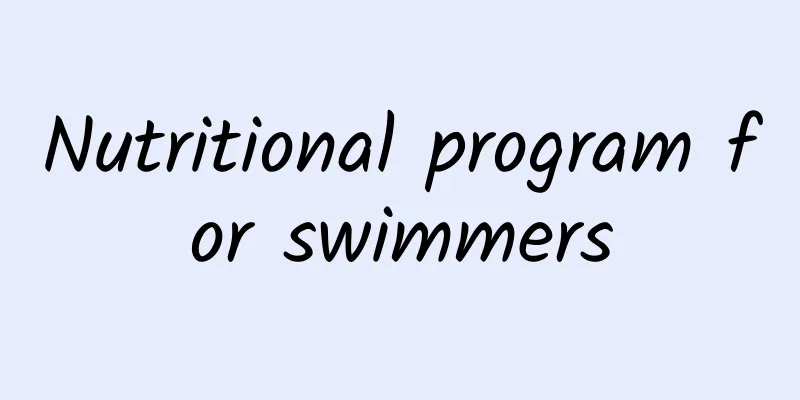Nutritional program for swimmers

|
The Tokyo Olympics, which was postponed due to the epidemic, will begin this month. Swimming has always been an event that everyone is concerned about. It is a proud thing for swimmers who cut through the waves in the arena to win gold medals. In addition to daily exercise, the results are also inseparable from a reasonable nutritional combination plan. Adequate nutrition can enable swimmers to maintain good athletic ability during training or competition and avoid the negative effects of insufficient energy intake. With the increasing attention paid to sports nutrition, current research suggests that carbohydrates, proteins, and fats for swimmers should account for 55% to 65%, 12% to 15%, and 25% to 35% of total energy, respectively. The daily energy supply ratio of three meals is 30%, 40%, and 30%, respectively. The daily dietary carbohydrate intake should not be less than 50% of the total daily energy intake, and the fat intake should not exceed 30% of the total daily energy intake. [1] What is the carbohydrate requirement of swimmers? We all know that carbohydrates are the main source of energy for the human body. Glucose is stored in muscles and liver as glycogen. The glycogen in the liver is called glycogen, and the glycogen in the muscles is called muscle glycogen. During exercise, muscle glycogen is the most easily available energy for muscles and is released faster than other energy sources. Swimmers will significantly consume their own muscle glycogen reserves during exercise, and the body is in an oxygen-deficient state. Adequate carbohydrates can reduce the body's oxygen debt and delay fatigue. If carbohydrate intake is insufficient, it will lead to chronic muscle fatigue. In addition, when the athlete's glycogen is about to be exhausted during exercise, the energy supply ratio of protein and fat in the body will further increase. Therefore, a moderate amount of sugar supplementation can not only resist fatigue, but also play a role in saving protein in the body. The carbohydrates for swimmers should be 55% to 65% of the total energy, and starch should be the main form. You can choose foods such as brown rice, whole wheat bread, and oatmeal porridge. [1] What are the protein requirements of swimmers? Protein is generally not used as the main energy source during exercise, and its energy supply ratio is relatively small, especially for low to medium intensity and short-term exercise. However, in long-distance events, glycogen is gradually consumed over time, and protein will maintain the stability of blood sugar levels through the gluconeogenesis pathway. Intake of appropriate amounts of protein can repair muscles damaged during exercise, improve muscle strength and muscle mass, and is called super recovery. However, protein intake is not the more the better. It should be sufficient and appropriate. Excessive intake will affect the body's normal metabolism, increase the burden on the liver and kidneys, cause damage to the immune system, and increase the risk of disease. Referring to the latest version of the dietary guidelines and nutrient reference intake, it is appropriate to account for 10% to 20% of total energy. It is recommended to choose beef and lamb as meat. Egg whites and milk also have high protein content. [1] What is the fat requirement of swimmers? In long-distance swimming events, fat is the main energy source. When fat is used as the main energy source, it consumes a lot of oxygen. When the body is not supplied with enough oxygen during exercise, fat metabolism is incomplete, lactic acid is generated, and the exercise level is affected. Fat is a deep energy source for the human body and is usually difficult to use. However, considering that swimmers train in water for a long time and have a large body heat dissipation, the demand for fat is higher than that of athletes in land events in order to better maintain the stability of core temperature in the water. However, dietary fat intake should be cautious to avoid excessive fat intake, which reduces the absorption of other nutrients, causes hyperlipidemia, slows down capillary blood flow, increases blood viscosity and heart burden, affects the gas exchange function of red blood cells, leads to a decrease in endurance and fatigue, affects exercise level, and affects health. It is currently believed that it should reach 25% to 35% of total energy, and should not exceed 35%. Athletes should avoid fried foods, margarine, fatty meat, chicken skin and other fatty foods in their daily diet. [1] [1]Cheng Zepeng. Nutrition survey of adolescent swimming and research on the effect of nutrition guidance.[M], Shanghai Institute of Physical Education, 2019. |
Recommend
What you put in your mouth every day is actually a Class I carcinogen. It’s not too late to throw it away now!
What you put in your mouth every day is actually ...
Know a little about “medicine” | How to prevent and treat bronchial asthma in winter?
With the coming of winter, bronchial asthma patie...
What to eat to inhibit uterine fibroids
Compared with other tumors, uterine fibroids are ...
IDC: China's tablet market shipments in 2022 will increase by 5.2% year-on-year
According to the latest International Data Corpor...
What kind of underwear can women wear without showing their breasts?
Women with small breasts are troubled, and women ...
Can moxibustion cure adenomyosis?
Can moxibustion cure adenomyosis? Uterine adenoma...
How many times a week does a 40-year-old woman
When women reach mature age, their body developme...
What to do if you haven't had your period for three months
Generally speaking, women's menstrual cycle i...
How to check white blood cells in gynecology?
White blood cells are important immune cells in t...
Is it kidney deficiency if a woman cannot urinate?
Kidney deficiency can cause urinary incontinence,...
Pregnant women with swollen hands and feet
Pregnant women will experience some pregnancy rea...
Will teeth cleaning make teeth looser? The whiter the teeth, the healthier they are? The truth is...
Will teeth cleaning make teeth looser? Will filli...
Dietary treatment for excessive brown vaginal discharge
It is a very common phenomenon that the amount of...
What are the characteristics and distribution of precipitation in the world? What is the device that measures precipitation called?
Precipitation refers to the depth of liquid or so...









